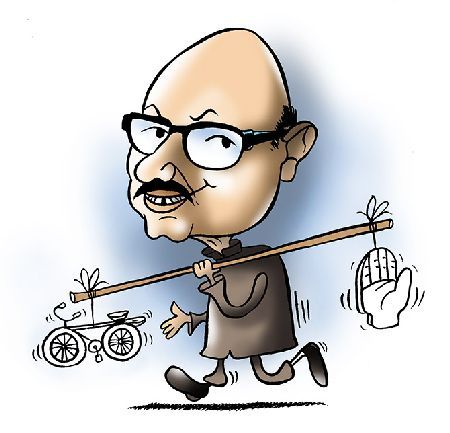Will Amar Singh be the go-between between the SP and Congress, asks Aditi Phadnis.
Illustration: Uttam Ghosh/Rediff.com
 Amar Singh is back: In the Rajya Sabha, the Samajwadi Party which expelled him several years ago, as well as in Netaji's heart.
Amar Singh is back: In the Rajya Sabha, the Samajwadi Party which expelled him several years ago, as well as in Netaji's heart.
What role is he going to play?
Everyone is looking at the UP assembly elections that the Bharatiya Janata Party desperately needs to win.
The victory will not just make a political point; it is also the only way to ensure the BJP holds the initiative in the election for the President of India (at this moment, it does not look as if an election can be avoided) due in July next year.
Top leaders in the BJP say forming a government in UP is difficult, but certainly not impossible. But they purse their lips and shake their heads.
They warn that judgement must be suspended until we know what the pattern of alliances is going to be.
For the BJP, it is well-nigh impossible to strike any new deals. The SP would not ally with them and given that Keshav Prasad Maurya has been made the chief of the BJP in the state, it is a powerful disincentive for Bahujan Samaj Party President Mayawati to agree to help the party.
Judging by the way she has been hitting out at the BJP lately, a beautiful relationship does not seem to be in the offing.
In the 2012 assembly elections, out of the total 403 seats, the Congress contested 355 and won 28, garnering 11.65 per cent of the total votes cast.
The SP contested 401 seats and bagged 224, getting 29.13 per cent of the vote share.
The BSP fought 403 seats, getting 80 seats and 25.91 per cent of the votes.
The BJP contested 398 seats and got 47, with 15 per cent of the votes.
Then came the Lok Sabha polls of 2014.
Of the 80 seats, the Congress got two, or 7.53 per cent of the votes.
The SP won five seats, or 22.35 per cent of the votes.
The BSP got nothing but still accounted for 19.7 per cent of the votes.
The BJP bagged 71 seats -- a whopping 42.63 per cent of the votes polled.
What does this tell us? Mathematically, only if the SP, BSP and the Congress were to tie up, would they be able to beat the BJP?
Politically, that is not possible. To create conditions for the BJP's defeat, at the very least, either the SP or the BSP has to tie up with the Congress.
In the past, Amar Singh has rendered crucial service to both the SP and the Congress.
It was he who introduced the Congress to the SP through his friend and mentor Harkishan Singh Surjeet.
In an interview to journalist Karan Thapar, no less than former prime minister Manmohan Singh recalled the circumstances in which the no-confidence motion -- after the Left parties pulled out of the government following the India-US civil nuclear agreement -- was passed by Parliament.
The SP was bitterly opposed to it and former President A P J Abdul Kalam and Amar Singh's intervention won the day.
'Of course, when I faced a vote of no confidence in Parliament (July 2008), he (Kalam) was no longer the President,' Manmohan Singh said. 'But even then he played a very important role in helping the deal go forward. That time, there was a problem with regard to the voting pattern... how it will go... The prospects of the government winning the vote of confidence were being questioned. And I was discussing these matters with Amar Singhji and also with Mulayam Singhji. And with great difficulty we managed to persuade them to (take a) re-look at their objections.'
'It occurred to me that Mulayam Singhji had great regard and respect for Dr Kalam,' the former prime minister told Thapar. 'So I suggested then to Amar Singhji (that) maybe if you don't believe my word, you might like to hear Abdul Kalam's. And they went to see Kalam and he told them that this deal is in the national interest, and that means the Samajwadi Party was on board and we won the vote of confidence.'
After a bitter falling-out with Mulayam Singh Yadav and family, Amar Singh is back again.
The decision-making fulcrum in the Congress has shifted slightly -- it is now moving towards Rahul Gandhi and Priyanka Gandhi Vadra.
In UP, both the SP and the Congress will only be dissipating their energies if they decide to fight each other.
Together there is a slight chance they could put up a good show.
Will Amar Singh be the go-between... again? He says he won't. But you never know.












 © 2025
© 2025